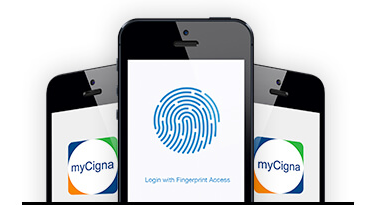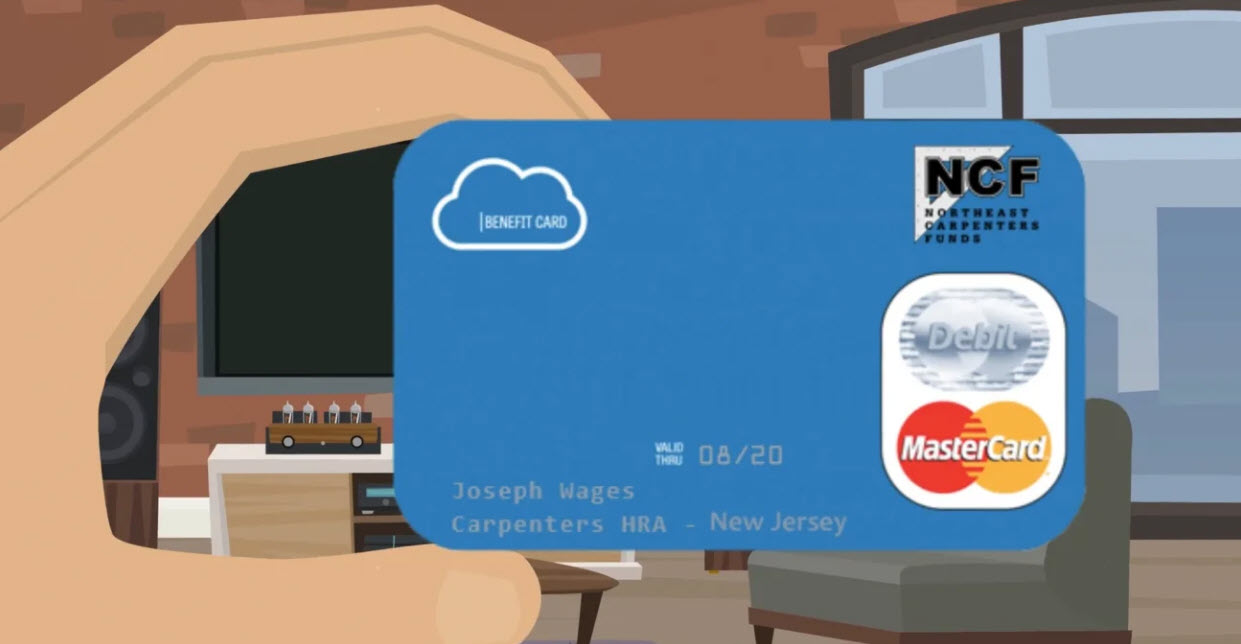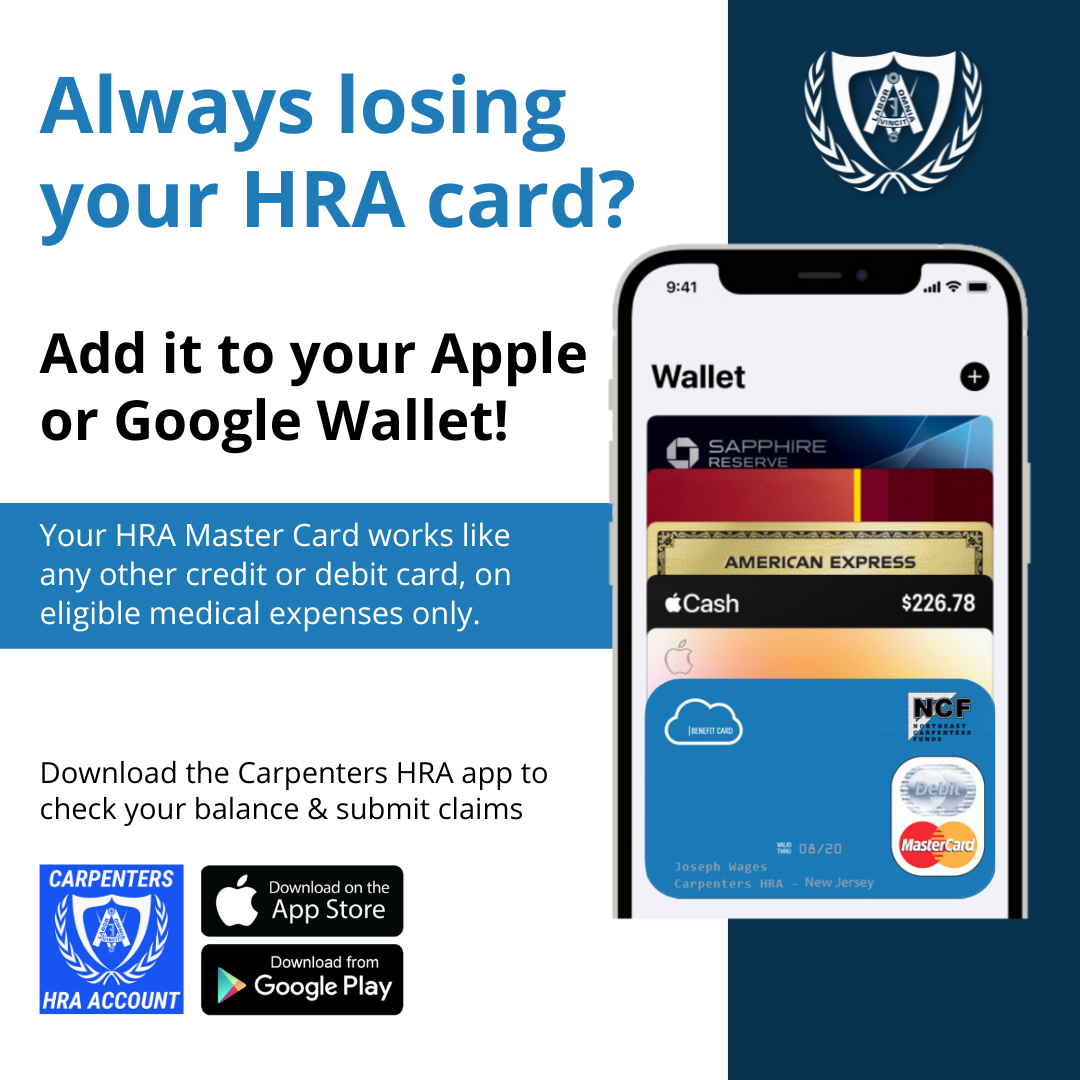HRA Account
Your HRA Account is an employer-paid contribution based on hours worked. These contributions can help cover your out-of-pocket medical, dental, vision, and eligible over-the-counter expenses.
HEALTH REIMBURSEMENT ACCOUNT (HRA)
How to Access Your HRA Benefit
Member Testimonial
Tell you what...really like having this card. I just paid a bunch of bills from doctor visits and didn't use any out of pocket money!
~ Steve - Local 251
HRA FAQs
Current tax laws require that the Plan limit HRA benefits to payment of eligible health care expenses. The HRA account can be used to reimburse you for eligible health care expenses which:
- Are incurred and paid for you, your eligible Spouse and your eligible Children for eligible goods or services;
- Are for the diagnosis, cure, mitigation, treatment or prevention of disease or treatments affecting any part or function of the body;
- Are not otherwise compensable by (or the responsibility of) an insurance carrier, a health plan or other third party, and
- Could be claimed as a medical expense deduction on a federal income tax return (without regard to limitations on deductibility based on a percentage of your income).
The rules on eligible health care expenses generally follow the federal income tax rules in Section 213 of the Internal Revenue Code (IRC) for medical expense deductions (without the limitation to amounts over a percentage of adjusted gross income). IRS Publication 502 (Medical and Dental Expenses) has multi-page lists of eligible and ineligible expenses. The current version of IRS Publication 502 can be found on the IRS website, www.irs.gov.
Here are some general examples of out-of-pocket expenses you can claim for reimbursement under current IRS regulations:
- Co-payments or costs for medical services legally rendered by physicians, surgeons, dentists, and other medical practitioners not covered by other health insurance or plans
- Costs of durable medical equipment (including wheelchairs) and diagnostic devices needed for medical care
- Premiums you pay for insurance that covers the expenses of medical care (with some exclusions noted in Publication 502), with post-tax dollars, including Medicare Part B and Medicare Part D premiums
- Ambulance costs
- Prescription drugs and co-payments, insulin and diabetic testing supplies
- Laboratory, X-rays, surgical, dental, therapy and other healing or diagnostic services
- Eye exams, glasses, contacts and laser surgery
- Hearing tests and hearing aids
- Dental exams, dental work and dentures
This is only a summary that is subject to ongoing IRS rules and changes in those rules.
An expense that is not eligible for payment from an employer-funded “Health Reimbursement Account” under the IRS rules on deductible medical expenses will not be an eligible HRA expense from the Plan.
IRS rules specify that, to be an eligible medical expense, medical care expenses must be primarily to alleviate or prevent a physical or mental defect or illness. Expenses are not eligible medical expenses if they would be normal living expenses or are merely beneficial to general health.
If you have out-of-pocket expenses, save your receipts and submit your claims using the Member Portal or Mobile App.
You cannot claim the following expenses under current IRS rules:
- Claims for more than your actual cost;
- Expenses which would be incurred or paid without regard to sickness, such as food or lodging outside of hospital care;
- Expenses for your general health, such as a vacation or health club dues;
- Capital expenses which improve the value of property or which are not made primarily for medical care;
- Non-prescription medicines, nutritional supplements, vitamins, herbal supplements, “natural medicines”;
- Household and personal care services, babysitting, childcare, except certain nursing-type services;
- Illegal operations and treatments, controlled substances under federal law (even if permitted by state law);
- Prescription or other drugs brought in (or ordered and shipped) from another country;
- Cosmetic surgery, weight-loss programs and similar items that do not meaningfully promote the proper function of the body or prevent or treat illness or disease;
- Premiums for coverage under an ACA Marketplace Plan or other individual health insurance policy; or
- Employee payments or premiums for other group health plan coverage (such as a spouse’s plan) that are paid with pre-tax dollars (namely, money that is not included in W-2 wages).
The HRA contributions do NOT expire at the end of a year under current tax rules. Any unused amount will roll over (without interest) to a following year until you have used your full HRA balance or forfeit your eligibility for HRA benefits.
Your HRA balance will be forfeited if you have 36 months of no contributions or claims paid from your HRA account.
If you are not enrolled in a level of coverage, another Group Health Plan, or COBRA, you may use your HRA but only up to the balance remaining in your HRA at the end of the last day of the Benefit Period in which you last had an active level of coverage.






